英语一般疑问句和回答
- 格式:doc
- 大小:23.00 KB
- 文档页数:3
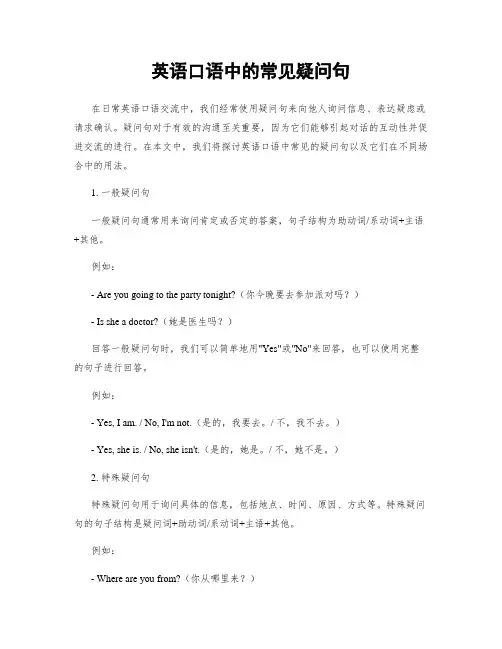
英语口语中的常见疑问句在日常英语口语交流中,我们经常使用疑问句来向他人询问信息、表达疑虑或请求确认。
疑问句对于有效的沟通至关重要,因为它们能够引起对话的互动性并促进交流的进行。
在本文中,我们将探讨英语口语中常见的疑问句以及它们在不同场合中的用法。
1. 一般疑问句一般疑问句通常用来询问肯定或否定的答案,句子结构为助动词/系动词+主语+其他。
例如:- Are you going to the party tonight?(你今晚要去参加派对吗?)- Is she a doctor?(她是医生吗?)回答一般疑问句时,我们可以简单地用"Yes"或"No"来回答,也可以使用完整的句子进行回答。
例如:- Yes, I am. / No, I'm not.(是的,我要去。
/ 不,我不去。
)- Yes, she is. / No, she isn't.(是的,她是。
/ 不,她不是。
)2. 特殊疑问句特殊疑问句用于询问具体的信息,包括地点、时间、原因、方式等。
特殊疑问句的句子结构是疑问词+助动词/系动词+主语+其他。
例如:- Where are you from?(你从哪里来?)- How did you learn to play the guitar?(你是如何学会弹吉他的?)- Why did he quit his job?(他为什么辞职了?)回答特殊疑问句时,我们需要提供具体的信息或解释。
例如:- I am from Canada.(我来自加拿大。
)- I learned to play the guitar by taking lessons.(我通过学习课程学会弹吉他的。
)- He quit his job because he wanted to start his own business.(他辞职是因为他想开自己的生意。
)3. 选择疑问句选择疑问句用来提供选项,询问对方的偏好、意见或选择。
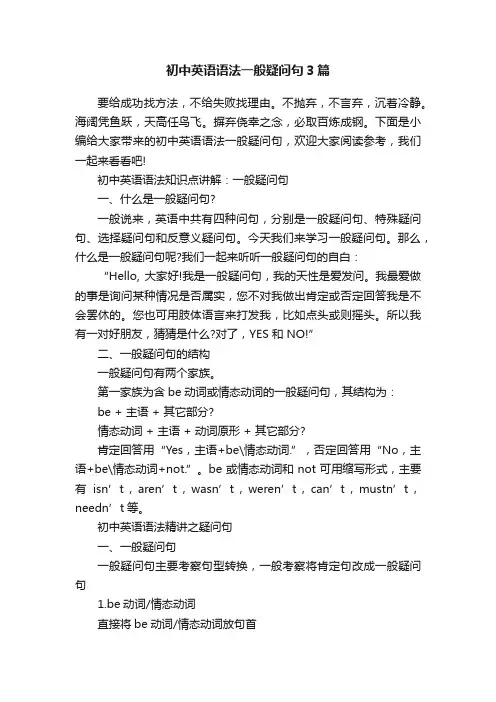
初中英语语法一般疑问句3篇要给成功找方法,不给失败找理由。
不抛弃,不言弃,沉着冷静。
海阔凭鱼跃,天高任鸟飞。
摒弃侥幸之念,必取百炼成钢。
下面是小编给大家带来的初中英语语法一般疑问句,欢迎大家阅读参考,我们一起来看看吧!初中英语语法知识点讲解:一般疑问句一、什么是一般疑问句?一般说来,英语中共有四种问句,分别是一般疑问句、特殊疑问句、选择疑问句和反意义疑问句。
今天我们来学习一般疑问句。
那么,什么是一般疑问句呢?我们一起来听听一般疑问句的自白:“Hello, 大家好!我是一般疑问句,我的天性是爱发问。
我最爱做的事是询问某种情况是否属实,您不对我做出肯定或否定回答我是不会罢休的。
您也可用肢体语言来打发我,比如点头或则摇头。
所以我有一对好朋友,猜猜是什么?对了,YES 和NO!”二、一般疑问句的结构一般疑问句有两个家族。
第一家族为含be动词或情态动词的一般疑问句,其结构为:be + 主语 + 其它部分?情态动词 + 主语 + 动词原形 + 其它部分?肯定回答用“Yes,主语+be\情态动词.”,否定回答用“No,主语+be\情态动词+not.”。
be或情态动词和not可用缩写形式,主要有isn’t,aren’t,wasn’t,weren’t,can’t,mustn’t,needn’t等。
初中英语语法精讲之疑问句一、一般疑问句一般疑问句主要考察句型转换,一般考察将肯定句改成一般疑问句1.be动词/情态动词直接将be动词/情态动词放句首He is a teacher. —— Is he a teacher?He can swim. —— Can he swim?He has finished his homework. ——Has he finished his homework?2.实义动词借助助动词do/does/did根据句子的时态和人称选择适当的助动词,并放在句首,后面的动词要改成原型(如果之前是原型,可不做变化)He walked to school last day.Did he walk to school last day?He walks to school every day.Does he walk to school every day?They play basketabll together every day.Do they play basketball together every day?注意:1.句中涉及some, something, someone 之类的一般要修改成any, anything, anyone等。
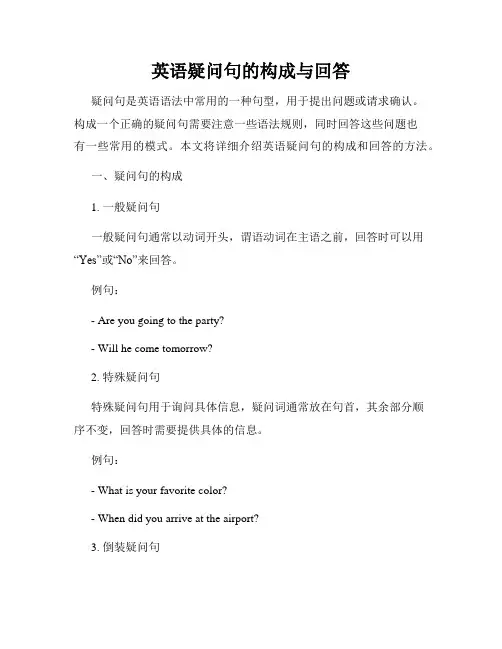
英语疑问句的构成与回答疑问句是英语语法中常用的一种句型,用于提出问题或请求确认。
构成一个正确的疑问句需要注意一些语法规则,同时回答这些问题也有一些常用的模式。
本文将详细介绍英语疑问句的构成和回答的方法。
一、疑问句的构成1. 一般疑问句一般疑问句通常以动词开头,谓语动词在主语之前,回答时可以用“Yes”或“No”来回答。
例句:- Are you going to the party?- Will he come tomorrow?2. 特殊疑问句特殊疑问句用于询问具体信息,疑问词通常放在句首,其余部分顺序不变,回答时需要提供具体的信息。
例句:- What is your favorite color?- When did you arrive at the airport?3. 倒装疑问句倒装疑问句通常由两个部分构成,第一部分是陈述句的部分,第二部分是疑问句的部分。
动词和主语的位置发生倒装,回答时可以用肯定或否定的形式回答。
例句:- You are a student, aren't you?- He can swim, can't he?二、疑问句的回答1. Yes/No回答对于一般疑问句,可以用"Yes"或"No"直接回答。
不需要重复整个句子,只需回答关键词即可。
例句:- Are you hungry? - Yes, I am. / No, I'm not.2. 提供具体信息回答对于特殊疑问句,需要提供具体信息作为回答。
回答时要把疑问词和回答部分连在一起,以完整句子的形式回答。
例句:- What is your favorite color? - My favorite color is blue.- When did you arrive at the airport? - I arrived at the airport at 9 am.3. 直接回答倒装疑问句对于倒装疑问句,可以直接回答第二部分的问题,采用相同的句式回答。
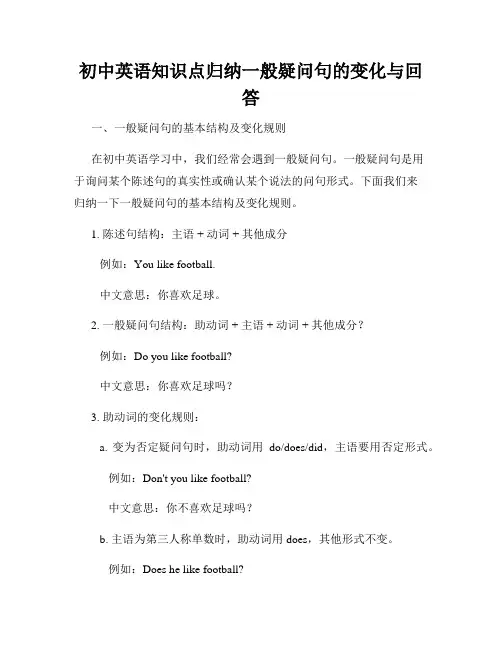
初中英语知识点归纳一般疑问句的变化与回答一、一般疑问句的基本结构及变化规则在初中英语学习中,我们经常会遇到一般疑问句。
一般疑问句是用于询问某个陈述句的真实性或确认某个说法的问句形式。
下面我们来归纳一下一般疑问句的基本结构及变化规则。
1. 陈述句结构:主语 + 动词 + 其他成分例如:You like football.中文意思:你喜欢足球。
2. 一般疑问句结构:助动词 + 主语 + 动词 + 其他成分?例如:Do you like football?中文意思:你喜欢足球吗?3. 助动词的变化规则:a. 变为否定疑问句时,助动词用do/does/did,主语要用否定形式。
例如:Don't you like football?中文意思:你不喜欢足球吗?b. 主语为第三人称单数时,助动词用does,其他形式不变。
例如:Does he like football?中文意思:他喜欢足球吗?4. 回答一般疑问句时的基本方式:a. Yes回答:表示肯定回答。
例如:Do you like football? Yes, I do.中文意思:你喜欢足球吗?是的,我喜欢。
b. No回答:表示否定回答。
例如:Do you like football? No, I don't.中文意思:你喜欢足球吗?不,我不喜欢。
二、一般疑问句的特殊情况及回答方式除了基本的一般疑问句结构和变化规则外,还存在一些特殊情况。
下面我们来看一下这些特殊情况及相应的回答方式。
1. 一般疑问句中的特殊疑问词:a. 特殊疑问词一般用来询问某个具体信息,如地点、时间、原因等。
例如:Where does he live?中文意思:他住在哪里?b. 特殊疑问词在一般疑问句中通常出现在句首,然后按照一般疑问句的结构进行变化。
例如:What do you want to eat?中文意思:你想吃什么?2. 含有情态动词的一般疑问句:a. 当一般疑问句中含有情态动词时,将情态动词放在句首,然后按照一般疑问句的结构进行变化。
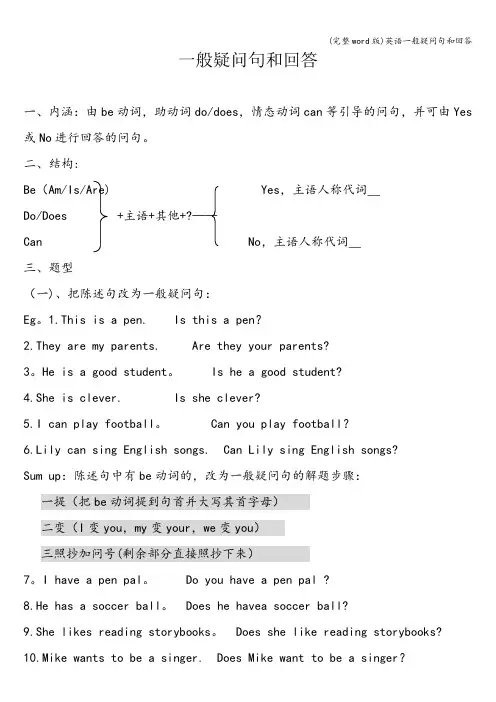
一般疑问句和回答一、内涵:由be动词,助动词do/does,情态动词can等引导的问句,并可由Yes 或No进行回答的问句。
二、结构:Be(Am/Is/Are) Yes,主语人称代词__Do/Does +主语+其他+?——Can No,主语人称代词__三、题型(一)、把陈述句改为一般疑问句:Eg。
1.This is a pen. Is this a pen?2.They are my parents. Are they your parents?3。
He is a good student。
Is he a good student?4.She is clever. Is she clever?5.I can play football。
Can you play football?6.Lily can sing English songs. Can Lily sing English songs?Sum up:陈述句中有be动词的,改为一般疑问句的解题步骤:一提(把be动词提到句首并大写其首字母)二变(I变you,my变your,we变you)三照抄加问号(剩余部分直接照抄下来)7。
I have a pen pal。
Do you have a pen pal ?8.He has a soccer ball。
Does he havea soccer ball?9.She likes reading storybooks。
Does she like reading storybooks?10.Mike wants to be a singer. Does Mike want to be a singer?Sum up:陈述句中有实意动词的(没有be/can),改为一般疑问句的解题步骤:一加(在句首加助动词Do/Does)二变(I变you,my变your,we变you)三照抄加问号(剩余部分直接照抄下来!实意动词要变回原型形式)练习:把下列句子改为一般疑问句.1。
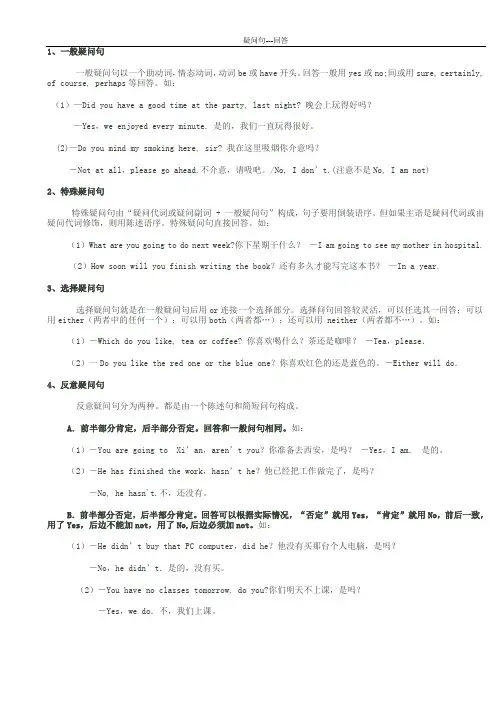
疑问句---回答1、一般疑问句一般疑问句以一个助动词,情态动词,动词be或have开头。
回答一般用yes或no;间或用sure, certainly, of course, perhaps等回答。
如:(1)—Did you have a good time at the party, last night? 晚会上玩得好吗?—Yes,we enjoyed every minute. 是的,我们一直玩得很好。
(2)—Do you mind my smoking here, sir? 我在这里吸烟你介意吗?-Not at all,please go ahead.不介意,请吸吧。
/No, I don’t.(注意不是No, I am not)2、特殊疑问句特殊疑问句由“疑问代词或疑问副词 + 一般疑问句”构成,句子要用倒装语序。
但如果主语是疑问代词或由疑问代词修饰,则用陈述语序。
特殊疑问句直接回答。
如:(1)What are you going to do next week?你下星期干什么?-I am going to see my mother in hospital.(2)How soon will you finish writing the book?还有多久才能写完这本书?—In a year.3、选择疑问句选择疑问句就是在一般疑问句后用or连接一个选择部分。
选择问句回答较灵活,可以任选其一回答;可以用either(两者中的任何一个);可以用both(两者都…);还可以用 neither(两者都不…)。
如:(1)-Which do you like, tea or coffee? 你喜欢喝什么?茶还是咖啡?-Tea,please.(2)一Do you like the red one or the blue one?你喜欢红色的还是蓝色的。
-Either will do.4、反意疑问句反意疑问句分为两种。
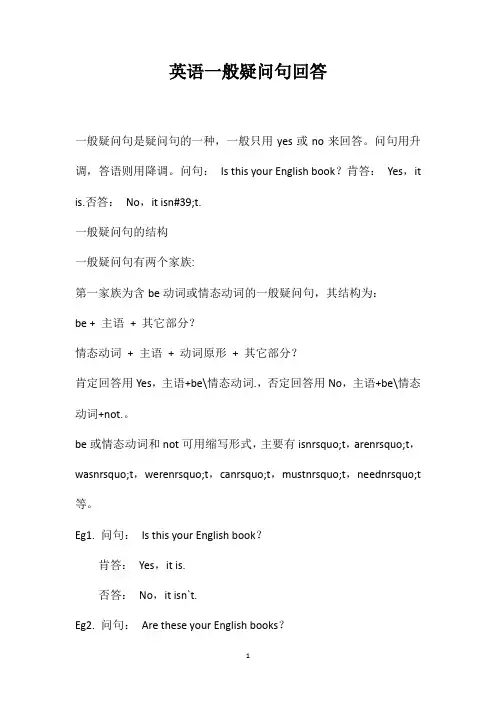
英语一般疑问句回答一般疑问句是疑问句的一种,一般只用yes或no来回答。
问句用升调,答语则用降调。
问句:Is this your English book?肯答:Yes,it is.否答:No,it isn#39;t.一般疑问句的结构一般疑问句有两个家族:第一家族为含be动词或情态动词的一般疑问句,其结构为:be + 主语+ 其它部分?情态动词+ 主语+ 动词原形+ 其它部分?肯定回答用Yes,主语+be\情态动词.,否定回答用No,主语+be\情态动词+not.。
be或情态动词和not可用缩写形式,主要有isnrsquo;t,arenrsquo;t,wasnrsquo;t,werenrsquo;t,canrsquo;t,mustnrsquo;t,neednrsquo;t 等。
Eg1. 问句:Is this your English book?肯答:Yes,it is.否答:No,it isn`t.Eg2. 问句:Are these your English books?肯答:Yes,they are.否答:No,they arenrsquo;t.Eg3. 问句:Can you speak English?肯答:Yes,I can.否答:No,I canrsquo;t.注意例句1和例句2,在回答时必须将this\that与these\those分别变为it和they。
另一家族为含行为动词(或称为实义动词)的一般疑问句,其结构为:助动词+ 主语+ 动词原形+ 其它?肯定回答用Yes, 主语+ do\does.,否定回答用No, 主语+do\does not.。
助动词也常用缩写形式,主要有donrsquo;t,doesnrsquo;t,didnrsquo;t 等。
Eg4. 问句:Do your parents like English?肯答:Yes,they do.否答:No,they donrsquo;t. [1]一般疑问句的回答正如前面所述,回答一般疑问句时有肯定回答和否定回答两种方式,肯定回答以Yes起句,否定回答用No开头。
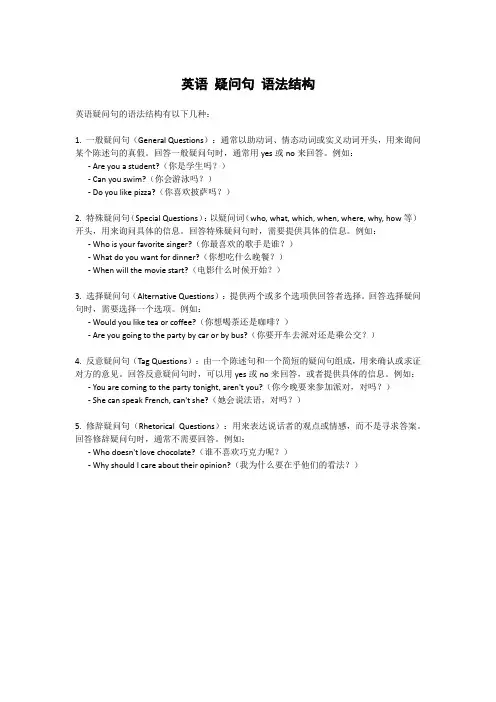
英语疑问句语法结构英语疑问句的语法结构有以下几种:1. 一般疑问句(General Questions):通常以助动词、情态动词或实义动词开头,用来询问某个陈述句的真假。
回答一般疑问句时,通常用yes或no来回答。
例如:- Are you a student?(你是学生吗?)- Can you swim?(你会游泳吗?)- Do you like pizza?(你喜欢披萨吗?)2. 特殊疑问句(Special Questions):以疑问词(who, what, which, when, where, why, how等)开头,用来询问具体的信息。
回答特殊疑问句时,需要提供具体的信息。
例如:- Who is your favorite singer?(你最喜欢的歌手是谁?)- What do you want for dinner?(你想吃什么晚餐?)- When will the movie start?(电影什么时候开始?)3. 选择疑问句(Alternative Questions):提供两个或多个选项供回答者选择。
回答选择疑问句时,需要选择一个选项。
例如:- Would you like tea or coffee?(你想喝茶还是咖啡?)- Are you going to the party by car or by bus?(你要开车去派对还是乘公交?)4. 反意疑问句(Tag Questions):由一个陈述句和一个简短的疑问句组成,用来确认或求证对方的意见。
回答反意疑问句时,可以用yes或no来回答,或者提供具体的信息。
例如:- You are coming to the party tonight, aren't you?(你今晚要来参加派对,对吗?)- She can speak French, can't she?(她会说法语,对吗?)5. 修辞疑问句(Rhetorical Questions):用来表达说话者的观点或情感,而不是寻求答案。

英语四种疑问句的用法归纳一、学习一般疑问句的五个要点就全句提出问题,希望对方给予肯定或否定答复的问句,叫做一般疑问句。
回答时要用Yes或No来开头,句末用问号,朗读时用升调。
(一)、一般疑问句的基本结构1. 如果谓语中有情态动词、助动词或be,将这些词移到主语之前。
如:Eg: Can you dance? 你会跳舞吗?Will he go there tomorrow? 他明天去那里?Are you a student? 你是学生吗?2. 如果谓语中没有情态动词、助动词或be,就在主语前加助动词do(does、did) ,原来的动词都用原形。
如:Eg: Do you like English? 你喜欢英语吗?Does your brother like English? 你的兄弟喜欢英语吗?Did you sleep well last night? 你昨晚睡得好吗?注:have做助动词时,将其移至主语前;作“有”解时也可以将其移至主语前;不是作“有”解的为行为动词时,其疑问式和其他行为动词一样要在主语前加do(does、did) 。
如:Eg: Has he gone to England? 他到英国去了?Have you (=Do you have) a car? 你有汽车吗?Do you have lunch at school? 你是在学校吃中饭的吗?(二)、一般疑问句的简略回答Eg: —Can you swim? 你会游泳吗?—Yes, I can. (No, I can’t) 会。
(不会)—Have you finished your work? 你工作做完了吗?—Yes, I have. (No, I haven’t. ) 做完了。
(还没有。
)—Is this your pen? 这是你的钢笔吗??—Yes, it is. (No, it isn’t) 是的。
(不是。
)(三)、一般疑问句的否定形式当说话人或是期待肯定的回答或是不期待对方的回答时用否定式。
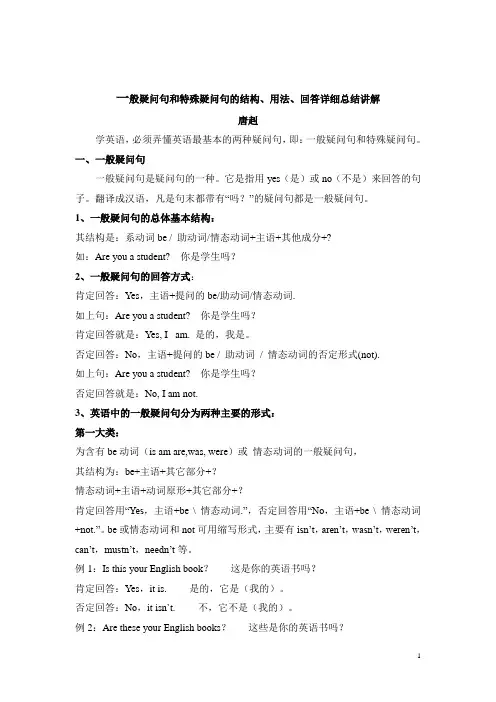
一般疑问句和特殊疑问句的结构、用法、回答详细总结讲解唐赳学英语,必须弄懂英语最基本的两种疑问句,即:一般疑问句和特殊疑问句。
一、一般疑问句一般疑问句是疑问句的一种。
它是指用yes(是)或no(不是)来回答的句子。
翻译成汉语,凡是句末都带有“吗?”的疑问句都是一般疑问句。
1、一般疑问句的总体基本结构:其结构是:系动词be / 助动词/情态动词+主语+其他成分+?如:Are you a student? 你是学生吗?2、一般疑问句的回答方式:肯定回答:Yes,主语+提问的be/助动词/情态动词.如上句:Are you a student? 你是学生吗?肯定回答就是:Yes, I am. 是的,我是。
否定回答:No,主语+提问的be / 助动词/ 情态动词的否定形式(not).如上句:Are you a student? 你是学生吗?否定回答就是:No, I am not.3、英语中的一般疑问句分为两种主要的形式:第一大类:为含有be动词(is am are,was, were)或情态动词的一般疑问句,其结构为:be+主语+其它部分+?情态动词+主语+动词原形+其它部分+?肯定回答用“Yes,主语+be \ 情态动词.”,否定回答用“No,主语+be \ 情态动词+not.”。
be或情态动词和not可用缩写形式,主要有isn’t,aren’t,wasn’t,weren’t,can’t,mustn’t,needn’t等。
例1:Is this your English book?这是你的英语书吗?肯定回答:Yes,it is. 是的,它是(我的)。
否定回答:No,it isn`t. 不,它不是(我的)。
例2:Are these your English books?这些是你的英语书吗?肯定回答:Yes,they are. 是的,它们是。
否定回答:No,they aren’t.不,它们不是。
例3: Can you speak English? 你能讲英语吗?(本句式含有情态动词can 的一般疑问句)肯定回答:Yes,I can. 是的,我能。
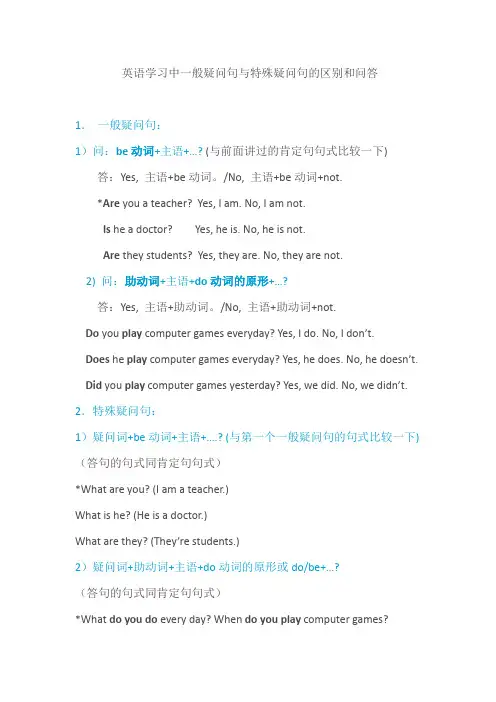
英语学习中一般疑问句与特殊疑问句的区别和问答1.一般疑问句:1)问:be动词+主语+…? (与前面讲过的肯定句句式比较一下) 答:Yes, 主语+be动词。
/No, 主语+be动词+not.*Are you a teacher? Yes, I am. No, I am not.Is he a doctor? Yes, he is. No, he is not.Are they students? Yes, they are. No, they are not.2) 问:助动词+主语+do动词的原形+…?答:Yes, 主语+助动词。
/No, 主语+助动词+not.Do you play computer games everyday? Yes, I do. No, I don’t.Does he play computer games everyday? Yes, he does. No, he doesn’t. Did you play computer games yesterday? Yes, we did. No, we didn’t. 2.特殊疑问句:1)疑问词+be动词+主语+….? (与第一个一般疑问句的句式比较一下)(答句的句式同肯定句句式)*What are you? (I am a teacher.)What is he? (He is a doctor.)What are they? (They’re students.)2)疑问词+助动词+主语+do动词的原形或do/be+…?(答句的句式同肯定句句式)*What do you do every day? When do you play computer games?(I play computer games everyday.)What does he do every day? When does he play computer games? (He plays computer games everyday.)What did you do every day? When did you play computer games? (We played computer games yesterday.)。
英语疑问句类型英语疑问句通常用于提问,以获取信息或确认某事。
以下是常见的英语疑问句类型:1. 一般疑问句(Yes/No Questions):这是最常见的疑问句类型,用来询问是否是肯定或否定的情况。
一般疑问句以助动词、系动词或情态动词开头,例如:“Are you coming?”(你来吗?),“Can she swim?”(她会游泳吗?)。
2. 特殊疑问句(Wh-Questions):这种疑问句类型用于询问特定信息,通常以疑问词(如what, where, when, why, how, who, which)开头,例如:“What is your name?”(你叫什么名字?),“Where are you going?”(你要去哪里?)。
3. 选择疑问句(Choice Questions):这类疑问句给对方提供了两个或更多的选项,以便他们选择其中一个来回答。
例如:“Do you want tea or coffee?”(你想要茶还是咖啡?)。
4. 反义疑问句(Tag Questions):这种疑问句附加在陈述句后面,用来确认或加强前面的陈述。
通常以肯定句陈述,然后以否定疑问词结尾,或以否定句陈述,然后以肯定疑问词结尾。
例如:“You like pizza, don't you?”(你喜欢披萨,是吗?),“She doesn't speak Spanish, does she?”(她不会说西班牙语,对吗?)。
5. 反问句(Echo Questions):这种疑问句是为了寻求对方的确认或重复之前的话语。
通常以与之前的陈述完全相同的方式重复前面的话语,例如:“It's a beautiful day, isn't it?”(今天天气真好,不是吗?)。
6. 以动词开头的疑问句(Verb-Starting Questions):这种疑问句以动词开头,通常用于正式场合,以获取信息或确认某事。
人教版英语七年级上册关于一般疑问句的回答突破改(含答案)人教版英语七年级上册关于一般疑问句的回答突破什么是一般疑问句?一般疑问句时疑问句中的一种,它是用yes(肯定)和no(否定)来回答的句子。
例如:Are you a boy 你是回个男孩吗?Are you a boy 回答:Yes , I am. \ No, I’m not.是的,我是。
\不,我不是。
又如:Is she your mother 她是你的妈妈吗?回答:Yes ,she is. \ No , she isn’t.是的,她是。
不,她不是。
注意:询问对象是女性,回答时,用人称代词she代替。
又如:Is Tom Smith your English teacher 汤姆史密斯是你的英语老师吗?回答:Yes ,he is. \ No , he isn’t.是的,他是。
不,他不是。
注意:询问对象是男性,在回答时,用人称代词he代替。
例如:Is Coco your dog 蔻蔻是你的狗狗吗?回答:Yes ,it is. \ No , it isn’t.是的,它是。
不,它不是。
注意:询问对象是动物或者事物,回答时用人称代词it代替。
例如:Are Tom and Bob in the same class 汤姆和鲍勃在同一个班吗?Yes ,they are. \ No , they aren’t.是的,他们是。
不,他们不是。
注意:询问对象是复数时,回答用人称代词it代替。
关于一般疑问句的回答。
在七年级上册阶段,我们只学习三种类型的一般疑问句,它们分别是:、含有情态动词的一般疑问句。
例如:I can say my ABCs. 其一般疑问句为:Can you say your ABCs回答:Yes , I can. \ No , I can’t.举一反三:根据提示,完成句子。
Can the boy go home at 5:00 (做否定回答)__________ , ________ ___________.Must she do homework at school (做肯定回答)_________ , ________ ________.They can go there by bus.(该为一般疑问句并做肯定回答)_________ they _______ there by bus回答:___________ , _________ _________.参考答案:No , he can’t. 2、Yes ,she must. 3、Can ; go ; Yes ; they ;can温馨提示:can引导的句子,没有人称和数的区别:I can \ she can \ you can \ he can \ they can、含有be动词(is \ am\ are)的一般疑问句。
四年级英语一般疑问句的构成及回答单选题40题1.Is there a library in your school?Yes,there is.No,there isn't.答案:Yes,there is.( 如果学校有图书馆就回答Yes,there is.如果没有就回答No,there isn't.)。
本题考查there be 句型的一般疑问句及回答。
there be 句型的一般疑问句将be 动词提前,回答用Yes,there is.或No,there isn't.2.Are there many books in the library?Yes,there are.No,there aren't.答案:Yes,there are.( 如果图书馆有很多书就回答Yes,there are.如果没有就回答No,there aren't.)。
本题考查there be 句型的一般疑问句及回答。
there be 句型的一般疑问句将be 动词提前,回答用Yes,there are.或No,there aren't.3.Is your classroom big?Yes,it is.No,it isn't.答案:Yes,it is. 如果教室大就回答Yes,it is.如果不大就回答No,it isn't.)。
本题考查含有be 动词的一般疑问句及回答。
be 动词is 放在句首,主语是your classroom,回答用it 代替。
4.Are the desks and chairs new?Yes,they are.No,they aren't.答案:Yes,they are. 如果桌椅是新的就回答Yes,they are.如果不是就回答No,they aren't.)。
本题考查含有be 动词的一般疑问句及回答。
be 动词are 放在句首,主语是the desks and chairs,回答用they 代替。
英语中的疑问句疑问句主要用来提问。
根据其语法结构和交际功能,可以分为以下四种类型:一般疑问句、特殊疑问句、选择疑问句和歧义疑问句。
Are you a fireman? 你是一名消防员吗?(一般疑问句)What do you do at the weekend? 你周末干什么? (特殊疑问句)Would you like to have rice or noodles? 你喜欢吃米饭还是面条? (选择疑问句)He is a Chinese teacher, isn't he? 他是一名汉语老师,不是吗?(反意疑问句)一、一般疑问句(yes-no question)一般疑问句通常用来询问一件事情或一种情况是否属实,其回答通常是 yes 或 no,因此这类问句又叫做“是非问句”1、肯定提问Is there something wrong with this machine? 这台机器有问题吗Have you got today's milk? 你拿到今天的牛奶了吗Shall we go on? 我们继续向前吗Must I finish my work on time? 我必须按时完成我的工作吗Can you speak French? 你会说法语吗Would you like me to interpret for you? 要不要我帮你翻译Do you have a smaller size? 你有小一点的尺寸吗Does Susan speak English? 苏珊讲英语吗Did you mom go shopping last weekend? 你妈妈上个周末去买东西了吗2、否定提问Will he not agree with you? 他不同意你吗Haven't you any sisters? 你没有姐妹吗Don't you like this movie? 你不喜欢这部电影吗Can't we go together? 我们不能一起去吗Won't you sit down? 你不想坐下吗Hasn't she been up to the mark lately? 最近她一直感到不太舒服吗3、回答Will you agree with us to e here? 你同意我们来这里吗Yes, we will. 是的,我们会 | No, we won't. 不,我们不会Have got today's newspaper? 你有今天的报纸吗Yes, I have. 是的,有 | No, I haven't. 不,没有Can't he afford a new house? 他买不起新房吗Yes, he can. 不,他能 | No, he can't. 是的,他不能二、特殊疑问句(special question)特殊疑问句是对句中的某一部分提出疑问,通常以 who、where、when、why等疑问词开头,因此又叫“wh-问句”1、疑问代词疑问代词:who、whom、whose、which、whatWho are you? 你是谁Whom are you going to play table tennis this afternoon? 今天下午你和谁打乒乓球Whose glasses are broken? 谁的眼镜打碎了Which shoes do you like? 你喜欢哪双鞋子What do they want to do? 他们想要做什么2、疑问副词疑问副词:when、where、why、howWhen does she want to practice? 她想要什么时候练习Where is the restroom? 洗手间在哪里Why did you leave? 你为什么离开了How do you study English? 你怎么学习英语3、how 构成的短语how 构成的短语:how about = what about 怎么样、how many times 多少次、how do you say... 你怎么说、how are you 普通问好、how many/much 多少、how old 多大年纪、how far 多远、how often 多久一次、 how long 多久、how soon 多久以后等How about bringing some ice cream? 带一些冰激凌怎么样How do you say this word in English? 你怎么用英语说这个单词Howare you? how are you 只是普通问好的方式。
1、She is Mary.否定句:She is not Mary.一般疑问句:Is she Mary?肯定回答:Yes, she is.否定回答:No, she isn’t.划线提问:Who is she?2、I am nine.否定句:I am not nine.一般疑问句:Are you nine?肯定回答:Yes, I am nine.否定回答:No, I am not nine.划线提问:How are you?3、My mother can dance.否定句:My mother can not dance.一般疑问句:Can your mother dance?肯定回答:Yes, she can.否定回答:No, she can’t划线提问:What can your mother do?4、My mother is tall.否定句:My mother is not tall.一般疑问句:Is your mother tall?肯定回答:Yes, she is.否定回答:Not, she isn’t.划线提问:How is your mother?5、Mrs Wang can dance well.否定句:Mrs Wang can’t dance well.一般疑问句:Can Mrs Wang dance well?肯定回答:Yes, she can.否定回答:No, she can’t.划线提问:What can Mrs Wang do?6、He is tall.一般疑问句:Is he tall?否定回答:No, he isn’t.7、Mr Zhang can write well.否定句:Mr Zhang can’t write well.8、She is my aunt.一般疑问句:Is she your aunt?肯定回答:Yes,she is.9、Mrs Li can’t write well.肯定句:Mrs Li can write well.10、He is Superboy.否定句:He is not Superboy.一般疑问句:Is he superboy?肯定回答:Yes, he is.否定回答:No, he isn’t.划线提问:Who is he?11、He is my father.一般疑问句:Is he your father?否定回答:No, he isn’t.12、Peter is a good boy.否定句:Peter is not a good boy.13、I can’t hop far like a kangaroo.划线提问:What can’t you do ?14、My brother is taking a nap.一般疑问句:Is your brother taking a nap?肯定回答:Yes,he is. (必须用人称)15、My sister is reading a book.否定句:My sister is not reading a book.一般疑问句:Is you sister reading a book?肯定回答:Yes, she is.否定回答:No, she isn’t.划线提问:What is your sister doing?16、The flowers are beautiful.划线提问:How are the flowers?17、The flowers are yellow.划线提问:What colour are the flowers?18、My mother is sitting on the grass.否定句:My mother is not sitting on the grass.一般疑问句:Is your mother sitting on the grass.肯定回答:Yes, she is.否定回答:No, she isn’t.划线提问:Where is your mother?19、I like the kites.一般疑问句:Do you like kites?20、He likes playing football.否定句:He does not like playing football.21、They are my rulers.否定句:They are not my rulers.一般疑问句:Are they your rulers?肯定回答:Yes, they are.否定回答:No,they are not.划线提问:What are they?22、I like to ride a bicycle.划线提问:What do you like to do ?23、They are my kites.一般疑问:Are they your kites?否定回答:No, they are not.24、I like playing football.否定句:I don’t like playing football.25、My father is tall.划线提问:Is your father tall?否定回答:No, he isn’t.26、You are singing.否定句:You _aren’t__ singing.27、My hair is straight.否定句,意思不变。
四年级英语一般疑问句的构成及回答单选题40题1. Do you like the red apple?A. Yes, I do.B. No, I don't.C. I don't know.答案:A。
解析:一般疑问句用Do 开头提问,回答用Yes, I do. 表示肯定,用No, I don't. 表示否定。
本题问是否喜欢红苹果,回答应该是肯定或否定,C 选项不符合题意,A 选项表示喜欢,B 选项表示不喜欢。
2. Is the cat black?A. Yes, it is.B. No, it isn't.C. Maybe.答案:A。
解析:一般疑问句用Is 开头提问,回答用Yes, it is. 表示肯定,No, it isn't. 表示否定。
本题问猫是不是黑色的,A 选项表示是黑色的,B 选项表示不是黑色的,C 选项不符合一般疑问句的回答。
3. Can you see the blue bird?A. Yes, I can.B. No, I can't.C. I'm not sure.答案:A。
解析:一般疑问句用Can 开头提问,回答用Yes, I can.表示能,No, I can't. 表示不能。
本题问是否能看到蓝色的鸟,A 选项表示能看到,B 选项表示不能看到,C 选项不符合要求。
4. Are these flowers pink?A. Yes, they are.B. No, they aren't.C. I don't think so.答案:A。
解析:一般疑问句用Are 开头提问,these flowers 是复数,回答用Yes, they are. 表示是粉色的,No, they aren't. 表示不是粉色的。
C 选项不符合一般疑问句的回答规则。
5. Do they have a white dog?A. Yes, they do.B. No, they don't.C. I have no idea.答案:A。
一般疑问句和回答
一、内涵:由be动词,助动词do/does,情态动词can等引导的问句,并可由Yes或No进行回答的问句。
二、结构:
三照抄加问号(剩余部分直接照抄下来)
7.Ihaveapenpal.Doyouhaveapenpal?
8.Hehasasoccerball.Doeshehaveasoccerball?
9.Shelikesreadingstorybooks.Doesshelikereadingstorybooks?
10.Mikewantstobeasinger.DoesMikewanttobeasinger?
Sumup:陈述句中有实意动词的(没有be/can),改为一般疑问句的解题步骤:一加(在句首加助动词Do/Does)
二变(I变you,my变your,we变you)
三照抄加问号(剩余部分直接照抄下来!实意动词要变回原型形式)
练习:把下列句子改为一般疑问句。
10.I’
(1)
2.Canyouplaythepipa?--Yes,Ican.(肯定回答)No,Ican’t.(否定回答)
3.Doyouhaveasister?--Yes,Ido.(肯定回答)No,Idon’t.(否定回答)
4.Doeshehaveahat?--Yes,Idoes.(肯定回答)No,Idoesn’t.(否定回答)
练习:
1.Isthisyourcup?--Yes,it______.
2.____thisyourroom?--No,itisn’t.
3.Aretheseyoursisters?--NO,they______.
4._____thoseyourpencils?--NO,theyaren’t.
5.Isthisyourfather?--Yes,it______.
6.Aretheseyourbrothers?--No,______aren’t.
7.AreyouTina?--Yes,______am.
it。